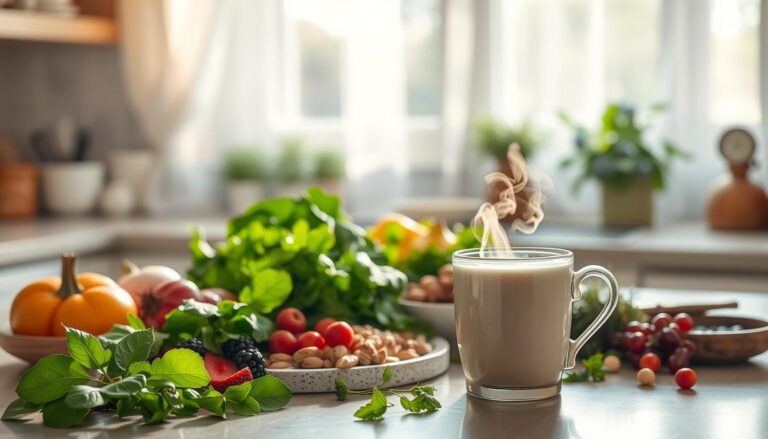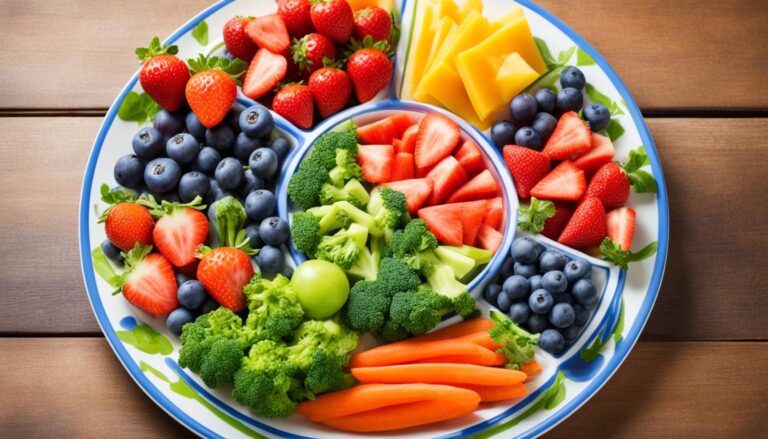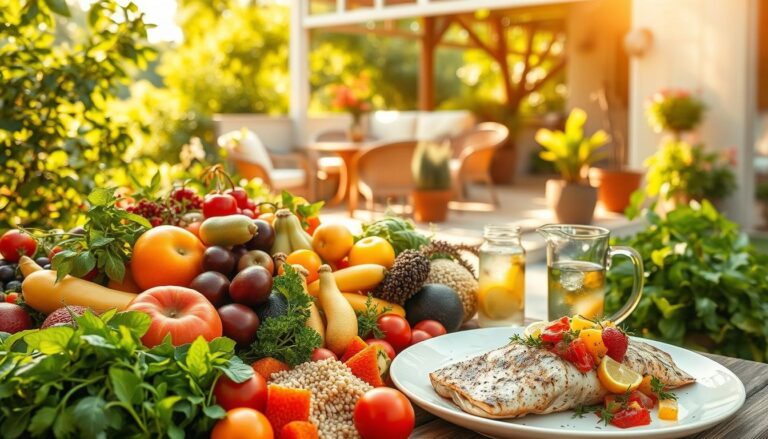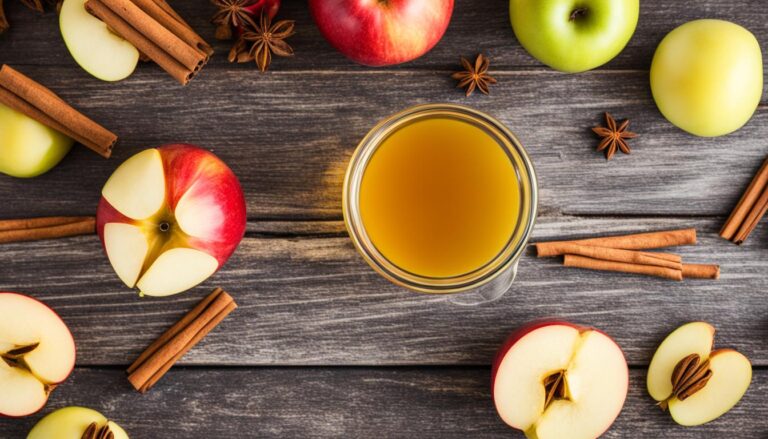Antioxidants are key to staying healthy and living longer. They fight off free radicals and oxidative stress.
These are big contributors to age-related diseases. But which antioxidant is the strongest?
This article dives into the world of antioxidants. We’ll look at their roles the best ones, and what makes them effective. From glutathione to coenzyme Q10, we’ll explore how these compounds can improve our health.
Key Takeaways
- Antioxidants are vital in fighting free radicals and oxidative stress.
- There are many antioxidants, each with its own benefits and roles in the body.
- Finding the most powerful antioxidant helps us make better choices for our health.
- Things like how well they’re absorbed and work together affect their strength.
- Eating a variety of healthy foods and using supplements can boost our health.
What Are Antioxidants?
Antioxidants are special compounds that protect our cells from harm. They fight off free radicals, which can damage cells and cause health problems. By stopping these free radicals, antioxidants help keep our cells healthy and support our overall well-being.
Antioxidants’ Role in the Body
Antioxidants do many good things for our bodies. They protect our cells, boost our immune system, reduce inflammation, and help our hearts and brains. Eating foods rich in antioxidants is key to fighting off free radicals and keeping our cells in top shape.
Free Radicals and Oxidative Stress
Free radicals are made when our bodies turn food into energy and when we’re exposed to toxins. These unstable molecules can harm our DNA and cause oxidative stress. Eating antioxidants helps neutralize these free radicals and protect our cells from damage.
| Antioxidant Source | Key Benefits |
|---|---|
| Coffee | The number one source of antioxidants in the average person’s diet in the US. Experts recommend consuming no more than four cups of caffeinated coffee per day. |
| Red Wine | Contains polyphenols found in grapes and is linked to heart health and disease prevention. |
| Dark Chocolate | Offers more antioxidants than milk or white chocolate, with a cocoa content of 70% or more being the most beneficial. |
| Eggs | Provide 10%-30% of the vitamins needed with two eggs per day. |
| Fatty Fish | Experts advise eating at least two servings of fatty fish like salmon weekly for heart health. |

Antioxidants are found in vitamins and minerals and help fight free radicals. The best way to get them is through food especially fruits vegetables nuts, and other plant based foods.
Top 5 Antioxidants for Overall Health
Some antioxidants are more powerful than others when it comes to health. Glutathione, Coenzyme Q10 CoQ10, vitamin E, vitamin C, and selenium are the best. They offer many health benefits.
Glutathione
Glutathione is called the master antioxidant. It’s made of glycine, cysteine, and glutamic acid. This antioxidant is key for detox immune support, and fighting aging.
It helps the lungs liver skin muscles, and boosts the immune system.
Coenzyme Q10 CoQ10
Coenzyme Q10 CoQ10 is vital for energy in cells. It protects cells from damage and helps the heart. Its antioxidant and anti-inflammatory effects are strong.
This makes CoQ10 a great supplement for health.
Glutathione and CoQ10 are two of the most powerful antioxidants that can provide a wide range of health benefits from detoxification to immune support and anti-aging.
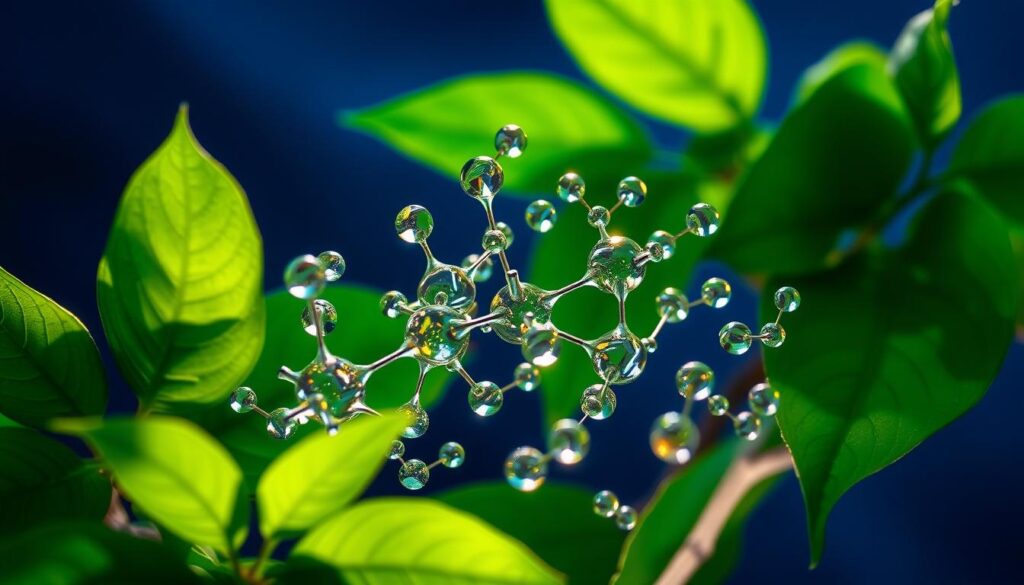
Vitamin E
Vitamin E is a strong antioxidant that helps keep our hearts healthy, boosts our immune system, and aids in breathing. It also helps manage allergies. This vitamin protects cells from damage and stops cholesterol from oxidizing, which can cause heart attacks and strokes.
Vitamin E includes eight compounds, with α-tocopherol being the most important for us. Adults need 15 mg of vitamin E daily. Sadly most Americans don’t get enough.
While vitamin E supplements might not prevent diseases like heart disease or cancer, some studies suggest they could help with age-related eye problems and fatty liver disease. Higher vitamin E intake might also lower the risk of dementia and Alzheimer’s, but more research is needed.
Too much vitamin E over 1,000 mg daily can harm vitamin K absorption and increase bleeding risk. Foods like plant oils, nuts, seeds fruits, and veggies are good sources of vitamin E. Wheat germ oil soybean oil, and sunflower seeds are especially rich in it.

Vitamin E is key for fighting oxidative stress and supporting health in many ways. While supplements might offer some benefits, eating a diet full of vitamin E-rich foods is best. This way, you get enough without the risks.
Vitamin C
Vitamin C’s Antioxidant Effects
Vitamin C is a powerful antioxidant that works inside and outside our cells. It not only fights off free radicals but also boosts the power of other antioxidants. This includes vitamin E and glutathione peroxidase enzymes, making it a key player in protecting our bodies.
The daily vitamin C intake is 90 milligrams for men and 75 milligrams for women. Taking more vitamin C can raise blood antioxidant levels by up to 30%. This makes it a strong ally for our health and wellbeing.
Vitamin C’s benefits are vast and include:
- Lowering blood pressure and cholesterol levels
- Reducing the risk of gout and anemia
- Improving wound healing and immune function
- Protecting brain health and cognitive function
While too much vitamin C from supplements can be harmful, eating enough of it is safe and beneficial. A balanced diet is the best way to keep your body strong against oxidative stress and damage.
Selenium
Selenium is a key mineral for health. It’s an antioxidant that helps protect cells from damage. It’s part of enzymes that fight off harmful free radicals.
Selenium is also vital for male fertility. Research shows it boosts sperm quality and quantity. This makes it crucial for reproductive health.
Selenium also supports the immune and endocrine systems. It helps the thyroid work right and may lower the risk of certain diseases. This includes autoimmune disorders like Hashimoto’s thyroiditis.
| Selenium-Rich Foods | Selenium Content |
|---|---|
| Oysters | 238% of the Daily Value DV per 3 ounces |
| Brazil Nuts | 174% of the DV per nut |
| Halibut | 171% of the DV per 6 ounces |
| Yellowfin Tuna | 167% of the DV per 3 ounces |
| Eggs | 56% of the DV per 2 large eggs |
Experts say we need 250-350 micrograms of selenium daily. But, many people don’t get enough. Eating foods high in selenium, like oysters and fish, can help meet this need.
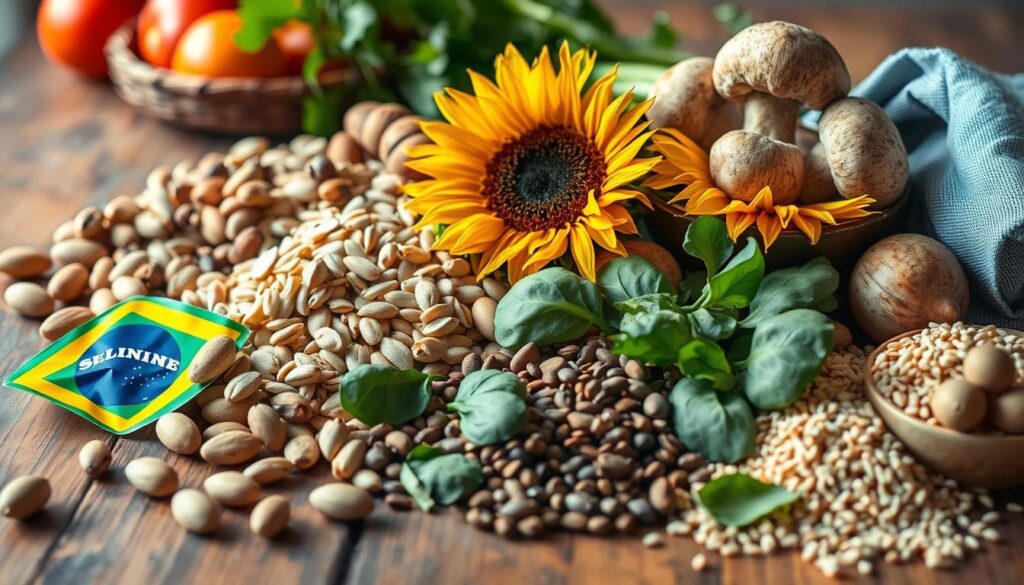
Selenium is a trace element that plays a crucial role in maintaining overall health and well being.
The Importance of Selenium Supplementation
Selenium supplements can also help meet our needs. They’re especially useful for those with certain health issues. The European Food Standards Agency says food State selenium supplements are the safest and most effective.
Getting selenium from food or supplements is beneficial. It supports immune and endocrine functions and male fertility. Adding selenium-rich foods to your diet can boost your health and well-being.
Recommended Daily Antioxidant Intake
It’s important to get enough antioxidants to fight free radicals and lower oxidative stress. This can help prevent many health problems. Experts say we need about 11.5 mmol Trolox equivalents (mmol TE) per day, based on a 2,500-calorie diet.
Plant-based foods are full of antioxidants. These include fruits vegetables, whole grains nuts seeds herbs spices, and cocoa. Blueberries blackberries raspberries strawberries, and cranberries are packed with antioxidants. Walnuts and pecans are also great sources.
Processed foods, like jam have fewer antioxidants than fresh ones. Cooking can also change how antioxidants work in our bodies. Some become more available with heat while others may lose their power.
While supplements have some benefits, eating whole foods is better supported by science. More antioxidants can lower the risk of heart disease cancer, and death. But, taking too many supplements can be harmful. They might increase the risk of lung or prostate cancer and interact with medicines.
The best way to get enough antioxidants is to eat a variety of plant-based foods. Natural antioxidants from whole foods are better for our health than artificial ones.
Best Antioxidant Foods
Nature gives us many foods rich in antioxidants, as shown by the FRAP test. Dark chocolate and pecans stand out, offering great health benefits.
Dark Chocolate
Dark chocolate, with at least 50% cocoa, is full of flavanol antioxidants. These help keep blood pressure healthy, improve blood flow, and protect the eyes. Studies show dark chocolate may also lower inflammation and heart disease risk.
Pecans
Pecans are packed with polyphenol antioxidants. They can boost blood antioxidant levels and help lower cholesterol, benefiting heart health.
Other foods rich in antioxidants include blueberries, strawberries, artichokes, goji berries, raspberries, kale, and beans. Adding these to your diet can improve vision, reduce inflammation, and lower disease risk.
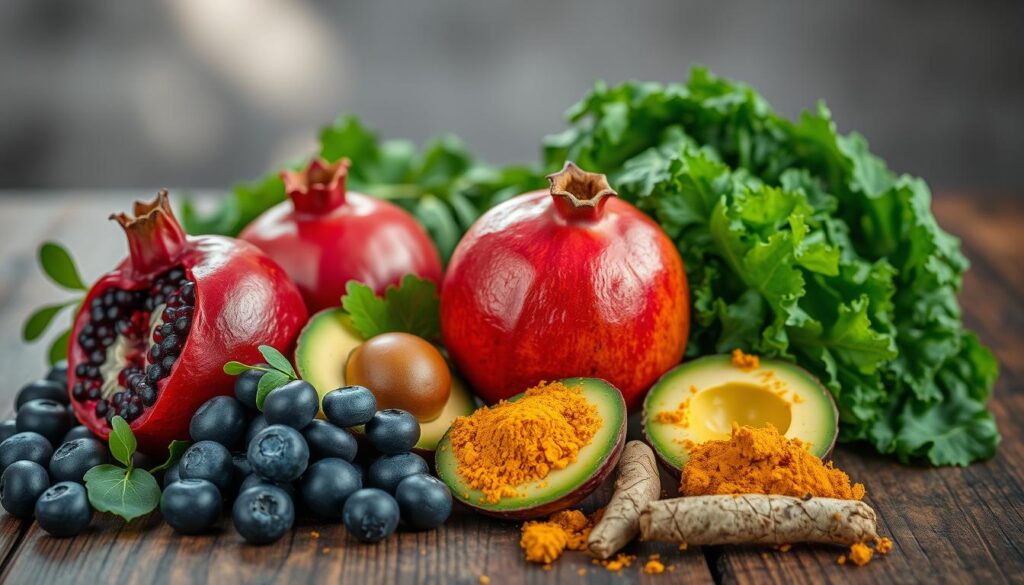
Which is the most powerful antioxidant?
Glutathione is often seen as the most powerful antioxidant. It’s called the master antioxidant because it’s great at fighting free radicals. This helps protect cells from damage.
Glutathione is a strong natural fighter against free radicals. Free radicals can harm cells and lead to diseases like cancer and heart disease. It’s a key player in keeping our bodies healthy.
By fighting free radicals, glutathione helps reduce oxidative stress. This stress is linked to many chronic diseases. It’s a big help in keeping our bodies in good shape.
Glutathione also helps the body get rid of toxins. It’s a hero in the fight against harmful substances. This makes it a key player in keeping us safe from harm.
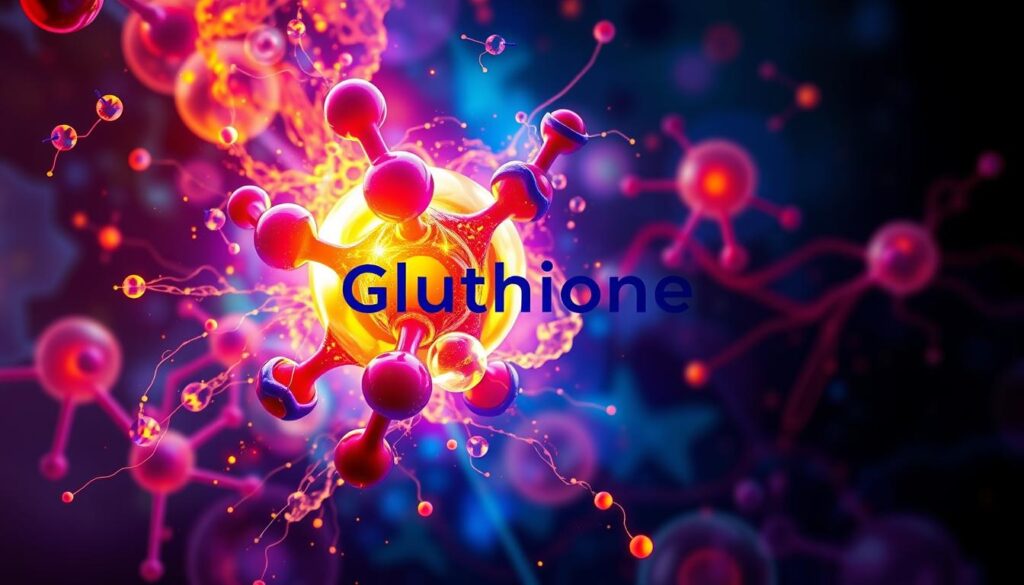
Glutathione is the body’s most powerful and essential antioxidant, helping to protect cells from oxidative stress and supporting overall health and wellness.
Antioxidant Supplements Safe or Not?
Antioxidant supplements can help increase your antioxidant levels.
But, it’s important to know if they are safe and work well. Some like CoQ10 and certain carotenoids might help with mitochondrial health and fight age related diseases. Yet we still need more research on their safety and the right dosage.
These supplements often have a lot of vitamins A, C, and E, and selenium. But, taking too much can cause problems. Studies show they might not help with exercise benefits as expected.
Meta-analyses also found that these supplements don’t lower cancer risks. In fact, they might even raise the risk of some cancers. For instance, beta-carotene can increase bladder and lung cancer risks in smokers.
However, selenium might help prevent cancer in people with low levels or high risk. But, we need more studies before we can say it’s safe for cancer prevention.
High doses of vitamin A can harm unborn babies, so pregnant women should avoid them. Smoking also means you need more vitamin C to fight cell damage.
In summary, while antioxidant supplements can be useful, we should be careful. Eating foods rich in antioxidants like veggies fruits, and nuts is safer and better for your health.
How Cooking Affects Antioxidant Levels
Heat Processing and Antioxidants
Cooking methods can change how much antioxidants are in our food. Boiling, baking, or frying can reduce some antioxidants like vitamin C. But, heat can also make some compounds like lycopene more available and active.
Boiling and steaming can cut down on Ascorbic Acid and Total Polyphenols by a lot. Stir-frying and roasting, however, have less effect. They reduce these nutrients by a smaller amount.
Boiling causes the biggest loss of antioxidants. Steaming, roasting, and stir-frying are better. Stir-frying and roasting keep more Ascorbic Acid and other nutrients in vegetables and greens.
Knowing how cooking affects antioxidants is key to getting the most benefits. To keep antioxidants, use less water when boiling. Drink the cooking liquid and don’t peel veggies before cooking.
Assessing Antioxidant Levels in the Body
To check an individual’s antioxidant levels, functional medicine tests are used. These tests look at antioxidant biomarkers like glutathione and coenzyme Q10 CoQ10. They also check for lipid peroxidation.
By looking at these antioxidant levels and oxidative stress indicators, doctors can understand how well someone’s body defends against damage. They can then suggest changes in diet or supplements to improve antioxidant status.
Many methods exist to measure antioxidant activity. For example, the Oxygen Radical Absorption Capacity (ORAC) test is used. It shows how well antioxidants fight free radicals and reactive oxygen species.
Biomarker tests also play a key role. They measure the levels of antioxidant enzymes like superoxide dismutase SOD and glutathione peroxidase GSH-Px. These tests help doctors spot any imbalances or deficiencies that might cause oxidative stress.
By using these antioxidant testing methods, healthcare professionals can fully understand an individual’s antioxidant status. They can then create a plan to boost antioxidant levels and reduce oxidative stress. This approach is essential for addressing any health issues related to imbalances or deficiencies.
Conclusion
Antioxidants are key in protecting our bodies from free radicals and oxidative stress. They help us understand the different types of antioxidants and how they work. This knowledge helps us make choices to keep our health strong.
Eating foods rich in antioxidants and using supplements wisely can help fight diseases. This includes heart problems, cancer, and inflammation. It’s a way to take care of our health as we age.
There are two main types of antioxidants: enzymatic and non-enzymatic. Enzymatic ones like SOD, GPx, and CAT protect cells. Non-enzymatic ones, like vitamins E and C, also help keep cells safe.
Keeping these antioxidants in balance helps our bodies fight off damage. This balance is key to staying healthy and living longer.
As scientists learn more about antioxidants, it’s crucial to stay updated. Making smart choices about what we eat and take as supplements is important. By using antioxidants, we can help keep ourselves healthy and look forward to a brighter future.
